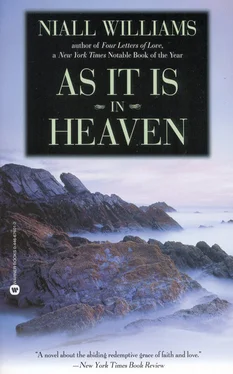It was a micro-season of happiness, a blissed-out moment of abandoned candlelight, and Stephen Griffin could sit at the table in the brief pleasure of knowing: This is joy, this is the richness of things, the brimming sense of the impossible becoming real, when the Hollywood version of himself might have danced about the table and taken Mary White in his arms, spinning her in loops of gaiety, fox-trotting and cha-cha-chaing out through the French doors and into the garden that even then exploded with fireworklike blossoms of orange and gold. There was tenderness in the sunlight and, in the gentleness of the air of that house that morning, a kind of clemency, as if the past had been swept softly with a horsehair brush and the lines of grief, disappointment, and failure were blurred now into the faded and waterpainted corners of the paper.
She had spoken to him.
Gabriella Castoldi had spoken to him, and for whatever came afterwards, whatever lay in the crisscrossed double-knotted stitching of the plot, and despite the reflex habitual expectation he had of everything in his life ending like a useless, lost thread that fitted nowhere in the fabric, Stephen Griffin was that morning briefly illumined with faith and calm in his heart, though he balanced precariously on the fast and silver needle of love.
He did not think of the way ahead. The morning gifted him with a blind optimism that was partly the confusion of his body following the sleepless moon-night, and he did not consider anything beyond that evening and seeing Gabriella play again. No thought of the following week lodged in his mind; Mrs. Waters and the school were not there, nor the enquiries she had already made about his father's health and the growing impatience and suspicion that were mounting in her mind, causing her to hear the morning news on the radio with the stiff cold porridge of dread in her mouth, certain that her history teacher would at any moment be covered in a bright red scandal and discovered in bed with another man. Neither this, nor any of the dull cautionary counsel of ordinary life that scorns and mocks romance, tells you you cannot leave your job and get in the car and go to Kerry to hear a woman play a violin, that you cannot walk out of your life like that on a whim, on a feeling, no, none of this did Stephen Griffin consider.
When he walked into Kenmare that morning, Nelly Grant sensed him coming. The town was in the sleepy aftermath of the party for the Man Who Releases the Balls and no custom had yet arrived for the Saturday traders at the top of the triangle. Stephen's stride was slaphappy and easy, and when he entered the shop he radiated the manic intensity that is shared by the hopelessly lost and the recently found. Nelly had known sometime in the night that his spirit was well, for the stillness of the moonlight foretold it, she believed, holding to the fairy credo that the energy of her principal clients was always reflected in the skies that they drew like children's paintings above them. It was an unproven but certain fact, she reckoned, that people make their own weather, that you could hold a grey cloud motionless in the air above you simply by the predisposition of your character towards the negative ions of depression. Look, she would say, at Connemara, and tell me it's not true.
When Stephen was three feet in front of her, he smelled like lilies, and this despite the aromatic display of oranges and lemons that filled the counter and the burning oil of rosewood in the dish beside the register. It was the scent of Gabriella Castoldi. And when Nelly caught it, opening her eyes wide as she drew it in, she knew the depth of feeling into which Stephen had alien and remarked silently to herself how she must sometime write down the wisdom of that mystery: how we come to smell of those we love and can carry them like the smallest ghosts in the infinity of our pores.
“You are well today,” she said, raising a lemon to her face and breathing the sharpness of its fragrance for clarity.
“You are a wonderful woman,” Stephen said. “I feel very well.”
“The concert was good?” She did not need to ask him, but wanted to hear in the timbre of his voice the inflection of the spirit.
“There was almost nobody there. Ha!” He laughed despite himself, thinking about it. “Well, she was. They both were. He played the piano, she …”
And the words were gone, vanished on the moment when he was about to speak of her and leaving him to fall into the whiteness of space, where his praise and yearning went, unsayable and vast. His Adam's apple, large as a Granny Smith, plunged and rose in the narrow and ropey confines of his gorge.
“Sit down in there. Drink this,” Nelly told him.
“What is it?” he asked her as she was stepping past him towards the ash-blond and supercilious figure of Helena Cox, the forty-five-year-old wife of the twenty-six-year-old butcher, Francie, who was just then entering the shop.
“Water. Good morning, Helena.”
“Isn't the weather so unpredictable?” said the butcher's wife, looking about for the disappeared man she knew was there. She had seen him come in all week from her window across the street and only now managed to arrive across in time before he left. Her face fell twelve years when she realized she had missed him.
“Like all of us,” said Nelly, taking with the smallest of smiles the net bag of Brussels sprouts that Helena held and which she knew were not the vegetable that the bound bowels of the Coxes needed. When the customer was gone, moving slowly with heavy weights of suspicion about the thickness of her ankles, Nelly Grant returned to Stephen in the backroom.
“She thinks you're having an affair with me,” she said, folding her arms on the warmth of herself and beaming at the man who was gulping the water and gazing on the air. “She senses love, though she doesn't know it. She has not found it with the butcher and is afraid somebody else might have found some.”
“I want something,” Stephen said. “I want something to help keep this, this.” He gestured at the air about himself as though there were visible a cloud.
“Strawberries,” she said. “Fruit of optimism.” And handed him a punnet she had bought at the morning market in Cork.
 Darkness fell at four o'clock. It was the first day of December, and when the sunlight was thinned out like beaten metal in the mid-afternoon the fog floated in like fine wrapping. The air smelled of wool and herbs, and might have slipped the town into fairytale sleep had it not been for the iron clatter of Guinness barrels, the last delivery between the mountains, and the twin Keogh brothers carting crates of empties that cackled with remembered delight like false teeth come alive.
Darkness fell at four o'clock. It was the first day of December, and when the sunlight was thinned out like beaten metal in the mid-afternoon the fog floated in like fine wrapping. The air smelled of wool and herbs, and might have slipped the town into fairytale sleep had it not been for the iron clatter of Guinness barrels, the last delivery between the mountains, and the twin Keogh brothers carting crates of empties that cackled with remembered delight like false teeth come alive.
Meanwhile, the town readied itself for Saturday night; it held its breath and did the small jobs. It hurried around the yard, it checked the football scores and ate its bread and butter and its slice of curranty brack, hearing the nightly tragedies on the news with mute and impotent anger, before washing its face, putting on a clean shirt, and going to stand outside seven o'clock Mass. By the time Father Moriarty was giving out Communion to the variously odoured breaths of his congregation, the pulse of the town had quickened, and for the first of the escapees, who had drifted away on the last word of the Gospel, the porter was already filling pint glasses on mahogany counters.
When Stephen walked out into the night, it was like walking into a pillow. He had to hold his face upward towards the obscured moon to find air. Scarves of fog entwined the mountains. When he arrived at the hotel, Maurice Harty on the door gave him a nod like a movie spy; the same girl was at Reception, and while she gave him his ticket she told him with deep self-pity that the crack at the previous night's computer bingo had supposedly been Unreal.
Читать дальше

 Darkness fell at four o'clock. It was the first day of December, and when the sunlight was thinned out like beaten metal in the mid-afternoon the fog floated in like fine wrapping. The air smelled of wool and herbs, and might have slipped the town into fairytale sleep had it not been for the iron clatter of Guinness barrels, the last delivery between the mountains, and the twin Keogh brothers carting crates of empties that cackled with remembered delight like false teeth come alive.
Darkness fell at four o'clock. It was the first day of December, and when the sunlight was thinned out like beaten metal in the mid-afternoon the fog floated in like fine wrapping. The air smelled of wool and herbs, and might have slipped the town into fairytale sleep had it not been for the iron clatter of Guinness barrels, the last delivery between the mountains, and the twin Keogh brothers carting crates of empties that cackled with remembered delight like false teeth come alive.









